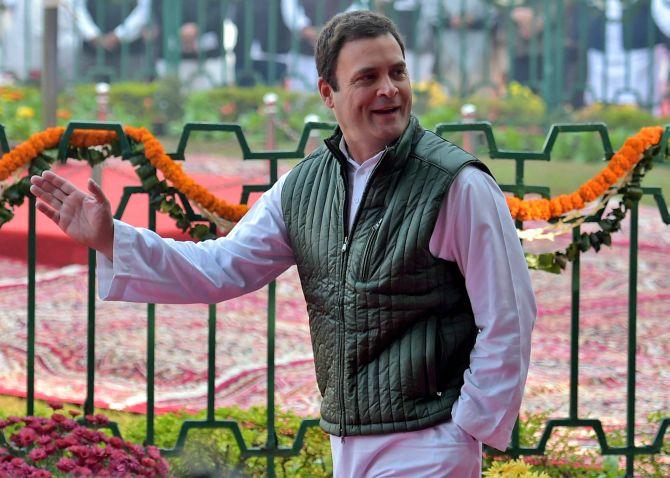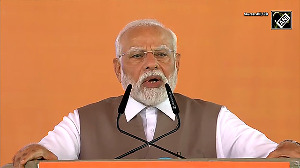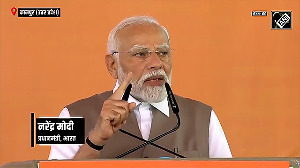From lining up allies to having them accept him as the Opposition’s prime ministerial candidate in the 2019 Lok Sabha elections, Congress president Rahul Gandhi’s real challenge has just begun, says N Sathiya Moorthy.

If anything, the results of the five-state assembly elections have reiterated the psephologist’s belief that the Indian voter invariably votes on ‘anti-incumbency’. Extended to the past, it could well mean it was anti-incumbency that won elections 2014 for the BJP-NDA, with Narendra Modi’s electrifying presence and emotive connect with the voters doing the rest. Projected to the future, will anti-incumbency be the main issue when the nation votes in the parliamentary polls, only months from now?
There is a greater problem for the ruling BJP at the Centre, during the short run-up to elections 2019. Unthinkingly since winning the 2014 polls, they continued to draw the Narendra Modi-Rahul Gandhi equation everywhere other than in panchayat polls. With the result, rather than widening the gap between the two as they had possibly intended, they have now narrowed the gap, especially after the five-state assembly polls, where only their two parties were in real contest.
With projections that this was a mini-general election, they have made Rahul Gandhi the prime ministerial candidate of not only his Congress party, which he anyway was, but also possibly of the entire Opposition. Now, it is incumbent upon most allies of the Congress, present and possibly signing in, in the coming months, to subconsciously accept that Rahul Gandhi is their prime ministerial candidate. If nothing else, Congress poll strategists are going to work on the premise, and towards that goal.
It may also be a hope and chance for the BJP and Modi. There are those in the Opposition camp with prime ministerial ambitions. Some of them are chief ministers in their own right, some of them hope to be the proverbial ‘dark horse’ or ‘black swan’, as they say. They have fed the idea to their cadres, though not all of their voters might have bought into the idea. Some may even believe it themselves. They are going to find it difficult to accept Rahul as their PM nominee, at least pre-poll.
Yet, in Rahul Gandhi, they all might fine a middle path to work together under the common Congress umbrella. Given the decades-old cadre animosity among some of them, they could pretend that in their respective states, they are only allies of the Congress, and not of the ‘other’ -- say, possibly, the ruling Trinamul Congress and the CPM in West Bengal.
The Congress could act tough with the likes of Sharad Pawar in Maharashtra in seat-sharing, yes, but then a weak BJP now, especially in the ‘western belt’ of which the state is one, Pawar could also tangle the BJP alliance before Rahul Gandhi, to get his pound of flesh in seat-sharing. So could the likes of Mamata Banerjee in West Bengal, who could interpret the five-state polls to mean that the Congress’s hopes for the Centre, having been kindled, the party may have to yield more, if only to win more, and to ensure electoral victory. The swap of seats for PM nomination may be another card that the regional allies of the Congress could well play.
Then there are the likes of Odisha Chief Minister Naveen Patnaik and Delhi’s Arvind Kejriwal, who would not know which way to go. Of course, at least Patnaik has a choice between the BJP and the Congress, if he believes that he is not strong enough anymore. Not Kejriwal, who would have to yield more to the Congress from Delhi seats, but then Rahul Gandhi could also have to be seen trouncing the dominant BJP in the Capital with its seven parliamentary seats.
Given perceptions of Kejriwal doing a good job as chief minister, especially for the poor and marginalised voters, in terms of education and healthcare, would he be now tempted to quit as chief minister, go it alone in simultaneous polls in May? Or, will Kejriwal be ready to partner with Rahul Gandhi, and seek more seats, say in neighbouring Punjab, where his AAP did make its presence in Elections 2014?
Then, the Congress would have to handle the communists in Kerala, where they used to be the only two players (or, their respective ‘fronts’), but now with the ‘Sabarimala issue’ throwing up the possibility of the BJP opening its account, if at all, their collective problem is not only sweeping the state, but also to ensure that the ‘saffron’ colour does not show up in the Kerala horizon. In neighbouring Tamil Nadu, DMK’s M K Stalin may be docile but is not going to yield more than his perception of what the Congress can win. After all, there are more Congress seat claimants in Tamil Nadu than there are seats (40, including Union territory of Puducherry).
It is again not going to be easy for the Congress in Karnataka, where it is sharing power with H D Deve Gowda’s JD-U. The ‘Telangana debacle’ in the company of Andhra’s TDP is not going to make things easy for the alliance in May, when Chief Minister Chandrababu Naidu is going to face twin polls to Parliament and the state assembly. In AP and so also in Telangana, the Congress lost its cadres and votes to Jagan Mohan Reddy’s YSR Congress, and the TDP is facing ‘anti-incumbency’ of long years that has afflicted the BJP in the five-State polls just now. Whether Telangana’s K Chandrasekhar Rao and his TRS can repeat the current performance in May or they would want to consolidate the ‘minority votes’ in the company of the MIM is a question that he would have to ask himself. That could also impact the Congress-TDP in the state.
Sonia-Rahul’s real problem still would be Uttar Pradesh. Granting that they both decide to contest, there is no guarantee of even a personal victory without a tri-party alliance with Akhilesh Yadav’s SP and Mayawati’s BSP, and their cadres working whole-heartedly for the alliance, across the state, without trying to cut out the other in select constituencies where their candidate is not in the fray.
The five-state results, and the BSP’s more-than-willing offer to support the Congress, wherever required, may have started off well, but then Mayawati is not the one to yield to easy negotiations on seat-sharing. It will still be incumbent upon Rahul Gandhi and the Congress to keep the BSP on their side and also bring in the SP, given that their votes together alone added up more than the BJP’s in the assembly polls last year.
In states where the Congress has won, the ubiquitous ‘high command’ (the phrase may overnight return to media currency) has to ensure that there are no typical infighting of the pre-2014 variety, leading to the party losing the present advantage in the parliamentary polls. It is easier said than done, as was evidenced in both MP and Rajasthan, where even the critical assembly poll did not encourage ‘faction leaders’ to stay put and together.
For the BJP, it may be still worse, PM Modi having distanced himself from the campaign for five-state assembly polls, returning to the centre-stage and getting him accepted readily by the ‘swing voters’ as in 2014, is not going to be easy. The proverbial ‘connect’ is chemistry, campaign dynamism alone would not do. Better or worse still, the media having projected the likes of Uttar Pradesh CM Adityanath as the BJP’s face in the five-state polls, and all those that Modi marginalised through the past five years and more, he cannot afford to hope that he can go to the voter directly and over the head of the party.
Instead, Modi still may have to hope to re-work his equations with the old guard, or whoever he has left behind, and also re-build the equations beyond BJP boss Amit Shah, to make the campaign team, if not the government, all-inclusive, at least for the few months left. He does not have much time left, either for this, for re-working ties and seat-sharing arrangements with existing and new allies.
N Sathiya Moorthy, veteran journalist and political analyst, is director, Observer Research Foundation, Chennai Chapter.











